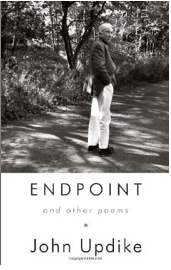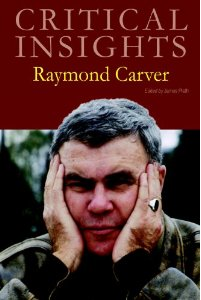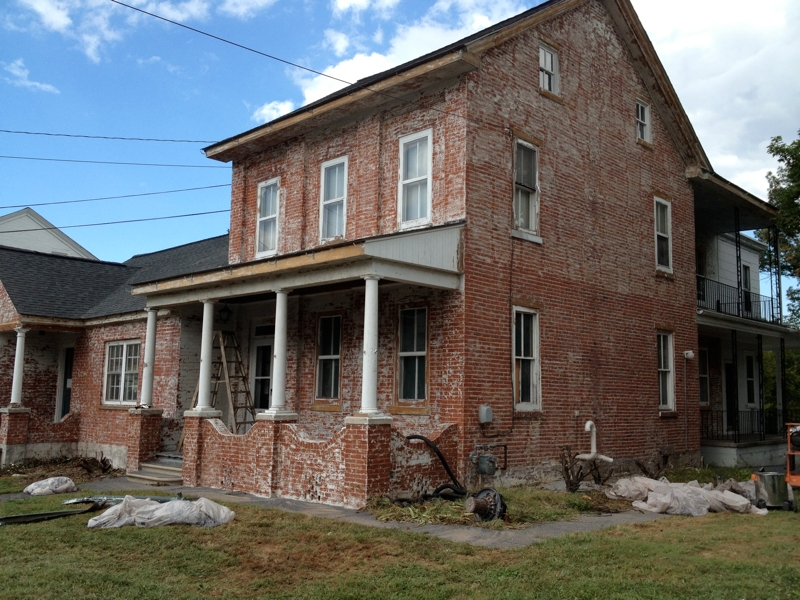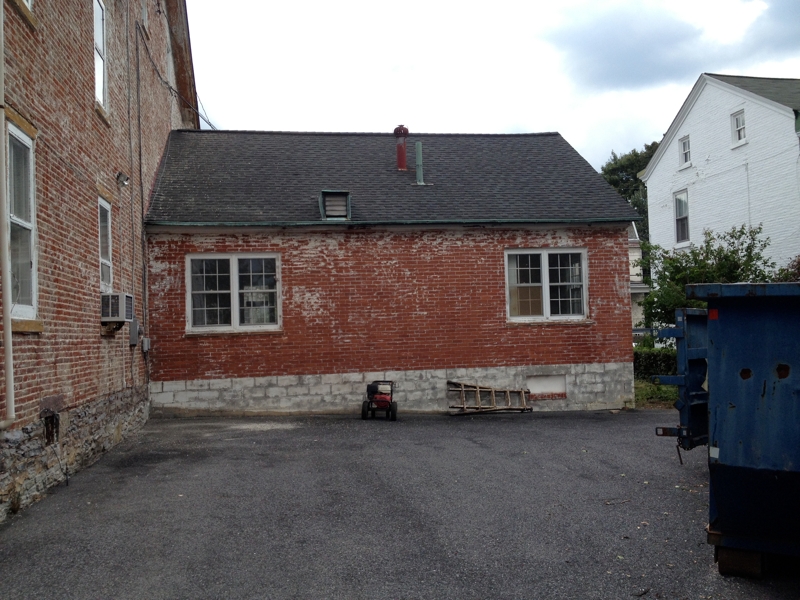 Albright College, where curator Maria Mogford teaches, ran a profile of her and the house restoration-in-progress. Here’s the link.
Albright College, where curator Maria Mogford teaches, ran a profile of her and the house restoration-in-progress. Here’s the link.
Author Archives: James Plath
Justin Cartwright’s Book of a Lifetime? Rabbit at Rest
The Independent [London] for September 13, 2013 featured a piece by writer Justin Cartwright, who picked Rabbit at Rest for his “Book of a Lifetime.”
“Rabbit at Rest is a wonderful book, honest, detailed, perceptive and moving,” he writes. “Although quietly charming and without any symptoms of Bohemia, Updike was ruthlessly forensic with his characters. His description of Rabbit’s wayward son, Nelson, is devastating: in contrast to the free pass to life that Rabbit grants himself—he is, in his reckoning, tall, athletic, open and attractive, with a full head of hair—his son is small, balding and furtive with a drug habit and—worse—a trite kind of philophy, confidently uttered. How accurately Updike captures the new banality.”
Here’s the full story.
Updike house gets a badly needed facelift
The John Updike Childhood Home at 117 Philadelphia Ave., Shillington, Pa., is getting a badly needed exterior paint job. The exterior had been neglected for many years prior to the Society’s purchase of the home, and compared to other buildings in the neighborhood it was looking quite shabby—with lead paint peeling off in big chunks, right down to the brick.
Although the scraping, preparation, and painting is costly and the Society is still in need of donations, the board voted to move forward based on a substantial gift from the Robert and Adele Schiff Family Foundation and a commitment from the PECO Foundation.
The work is being done by a Shillington company: Bilger Construction, affiliated with PuroClean Emergency Restoration Service, also of Shillington. The house will be repainted white, as it appeared for the bulk of the time that the Updikes lived there.
Writer’s Almanac features Updike poem
The poem for September 10, 2013 is “Thunderstorm in Dorset, Vermont,” by John Updike, from his last collection, Endpoint. Download or listen to it here.
Franzen goes fecal on Updike in a Paris Review rant
Some people think Jonathan Franzen is a literary giant; others think he’s just another talent with gigantic arrogance—the kind that enables him to turn down Oprah when every other writer in the country would do headstands for the chance to get that kind of audience.
What you think of him will probably affect what you think of the surprisingly nasty anti-Updike rant he went on in one of the “footnote excerpts” from Franzen’s translation of Austrian writer Karl Kraus that was posted September 6, 2013 on the Paris Review Daily.
What set him off was “Updike’s famous comparison of a writer’s work to excretion: you take in life, digest it, and shit it out in paragraphs,” and that leads him to a remarkably long and vitriolic rant which feels in part like a confession and part shotgun blast that also manages to shower a few buckshot pellets in Philip Roth’s direction.
It all sounds terribly Freudian, doesn’t it? Kill the [literary] father(s), and all that . . . . Some may smile that he also may have confirmed the excrement analogy with an example of his own.
Philly.com highlights Updike house restoration
In an Art Attack feature for Philly.com, Nathaniel Popkin writes about the restoration-in-progress of The John Updike Childhood Home at 117 Philadelphia Ave. in Shillington, Pa.
Thus far, Habitat volunteers coordinated by Tim Daley under the direction of site manager Russell Poper have taken out built-ins that compromised the integrity of the house and are in the process of removing wallpaper and tile flooring that were added in later years. The goal is to restore the house to what it might have looked like in the early 1940s, when young Updike lived there. That includes replanting a horse chestnut tree in the front yard, replacing wrought iron with intricate wood railings on the upper porch, and rebuilding a grape arbor that provided shade for the side porch. Continue reading
Updike golf photo used to illustrate a grouchy column
The Guardian posted a rather grouchy column by Colin Robinson, “Writers should take a year off, and give us all a break,” illustrated by a photo of an older John Updike in backswing, looking at the flight of his drive.
“What if everyone stopped scribbling for a year? Will Self could pull on his hiking boots, Martin Amis could sharpen his tennis serve, and we could catch up on our reading,” Robinson writes. Apparently the glut of established writers is made even more pressing by a statistic he quotes: that according the The New York Times, 81 percent of Americans feel they have a book in them.
Alec Baldwin signs on for Symphony Space Updike reading
 Alec Baldwin (30 Rock) has just been announced as a reader for the Symphony Space/Selected Shorts “Stories of John Updike” event. Tickets are now available for the October 16 event at Peter Jay Sharp Theatre in New York City.
Alec Baldwin (30 Rock) has just been announced as a reader for the Symphony Space/Selected Shorts “Stories of John Updike” event. Tickets are now available for the October 16 event at Peter Jay Sharp Theatre in New York City.
The event will be broadcast on over 130 stations to about 300,000 listeners, but this is your chance to be part of the live audience for a special event featuring Baldwin, Sally Field, and other guest readers yet to be announced. Tony Kushner and other artists will introduce favorite Updike stories in celebration of The Library of America’s two volume set, John Updike: The collected Stories.
“Endpoint” reviewed
 March 31, 2009 was the publication date for Endpoint, Updike’s final collection of poems. These are the reviews of which we’re aware.
March 31, 2009 was the publication date for Endpoint, Updike’s final collection of poems. These are the reviews of which we’re aware.
“Endpoint and Other Poems.” Publishers Weekly. March 30, 2009. “Many delights but few real surprises await Updike’s admirers in this last book of poems from the prolific essayist and novelist, completed only weeks before his death.”
“The New Yorker: ‘Endpoint’—Poems by John Updike.” Cliff Garstang. Perpetual Folly. March 18, 2009. “The speed with which this book is being produced no doubt makes good business sense, but seems grisly to me, particularly if the excerpt in TNY is an indication of the overall subject matter.”
“‘Endpoint and Other Poems’ by John Updike.” Carmela Ciuraru. March 31, 2009. “These last poems are tender, nostalgic but never sentimental.”
“Endpoint and Other Poems.” Ray Olson. Booklist Online. April 1, 2009. Olson writes that “these are personal but not egotistic poems. It seems as though Updike were aiming to record the end of the life of a successful enough American middle-class male, and in his novelist’s voice.”
“Updike’s ENDPOINT: Light at Sunset.” W. Scott Smoot. The Word Sanctuary. April 11, 2009. “In his writing, Updike never shied from the darkest and foulest parts (however often I wished he had), but he always highlighted ‘whatever is good, whatever is true, whatever is just’ in the subject at hand,” Smoot writes. “Nine years after AMERICANA, he turns that same light on his own aging and death in ENDPOINT AND OTHER POEMS.”
“’Endpoint: And Other Poems,’ by John Updike.” Nicholas Delbanco. San Francisco Chronicle. April 12, 2009. “. . . it’s doubly a shock and revelation when the palate darkens and the poetry goes deep. The titular series, ‘Endpoint,’ seems to this reader an act of sustained self-examination, and very brave.”
Updike and Carver essay appears in Critical Insights: Raymond Carver
 Matthew Shipe’s essay, “Middle-Age Crazy: Men Behaving Badly in the Fiction of Raymond Carver and John Updike,” appears in the recently published Critical Insights: Raymond Carver, edited by James Plath. Shipe compares the fiction of two writers whose creative and personal lives couldn’t be more different. Yet, Carver and Updike, whose New Yorker background and stories reflect a life that’s more privileged, find a point of intersection in that their male characters tend to behave badly—especially in relation to the women in their lives and in matters of responsibility. Characters often give in to their impulses, putting themselves first no matter how much they seem to care about the others in their lives.
Matthew Shipe’s essay, “Middle-Age Crazy: Men Behaving Badly in the Fiction of Raymond Carver and John Updike,” appears in the recently published Critical Insights: Raymond Carver, edited by James Plath. Shipe compares the fiction of two writers whose creative and personal lives couldn’t be more different. Yet, Carver and Updike, whose New Yorker background and stories reflect a life that’s more privileged, find a point of intersection in that their male characters tend to behave badly—especially in relation to the women in their lives and in matters of responsibility. Characters often give in to their impulses, putting themselves first no matter how much they seem to care about the others in their lives.
The book is available from Amazon.com.



